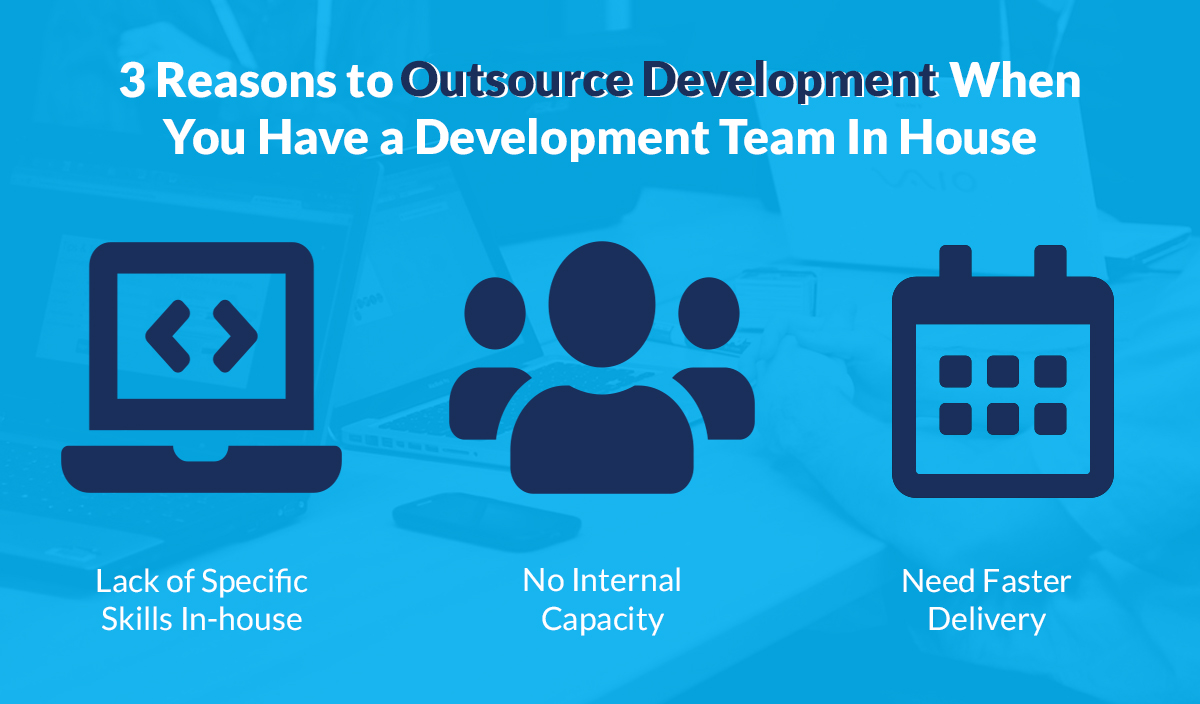
When you have a software-related idea or project—which could be building a new platform or making enhancements to existing systems—you have to decide how you’re going to turn it into reality. Should you have your in-house development
team do the work (if you have an internal team)? Or should you outsource the project to a developer or development company?
The answer, as with many things in the world of software, is: it depends.
It depends on the type of project; the makeup of your internal team and whether you even have one; and project-related factors like timeline, budget, and tech stack.
Think Strategically
There are a few different ways to approach the decision of whether or not to outsource your software development. If you don’t have an internal development team, the decision could be pretty straightforward. Unless adding developers to your internal
team is a feasible and strategically sound option, outsourcing is the obvious route. It’s when you already have resources on your team who could do the work that it gets tricky. Then it comes down to whether they should do
the work.
You may have an IT team that manages hardware, servers, and other internal technology work. But don’t mistake IT personnel for developers. Just because someone deals with computers doesn’t mean they are capable of building software. However,
in some cases, a developer or a team of developers—often one segment of the IT team—is specifically dedicated to building and maintaining software systems across the company. If your business doesn’t have these types of development
resources, it almost always makes sense to outsource your software projects because of the long-term costs (hard and soft) of bringing on and managing a team of developers.
If you already have development resources within your internal IT team, your first instinct might be to only use your team and not to outsource projects to development partners. While your internal team should certainly be the first stop on your software
development information gathering journey, defaulting to this option can be short-sighted.
3 Reasons to Outsource Development When You Have a Development Team
There are certain situations and projects where outsourcing software development is a really productive option. Depending on the scope of your project, your company size, and the type of work you need, at least considering outsourcing as an option is
smart. Below are three of the most common reasons businesses decide to outsource some or all of their development needs.

1. Lack of Specific Skills In-house
Even if you have an in-house development team at your disposal, it doesn’t mean your team is properly equipped for every project. When your project requires using a new technology or implementing something your team doesn’t have experience
with, outsourcing is a great way to quickly—and cost-effectively—get access to necessary experts.
2. No Internal Capacity
Chances are, your IT team members wear multiple hats. Every day they’re busy solving problems, putting out fires, supporting and enhancing existing systems, and generally contributing to the day-to-day functioning of your business. Adding to their
workload or pulling them off these priorities entirely to work on a new development project can be extremely inefficient. At worst, it could be harmful to the business as team members are overloaded and work falls through the cracks. Finding a person
or company dedicated to new development will allow your team to continue its important work while software projects move forward.
3. Need Faster Delivery
Time is money. It’s an old cliché, but still as true today (and maybe even more so) as it was the first time it was uttered. Whether it’s a lack of the right skills or capacity to do the work as mentioned above, trying to do a software
development project yourself can slow your timeline down considerably. When you outsource development to third-party partners, the project can get the focus it requires to move forward quickly. This can mean being first to market, having more time
to test, or more quickly retiring that expensive legacy system.
Making it Work
In any case, make sure you understand the requirements and scope of your project because knowing your needs will help you uncover whether outsourcing may be your best option and which model makes the most sense for your business.
You can choose from several different setups when it comes to balancing internal and external development resources:
- Outsource specific, relatively independent development projects.
- Integrate your internal team and your external resources so they’re working in tandem.
- Hire contract developers who essentially become temporary members of your team.
At Far Reach, we add the most value on independent development projects because of the business analysis and software strategy skills we bring to the table. For example, we’re often brought on to build entirely new systems or for specific functionality in existing or ongoing projects.
Software Development Outsourcing Options
Developing software requires knowledge and proficiency in a wide range of programming languages, frameworks, and tools. It also requires strategic knowledge in architecting and building durable platforms. You should look for development partners that
have experience in building high-quality and reliable systems that are similar to what you need.
There are a few different models for outsourcing your software development needs. There are even different ways within each model to set up your partnership to fit your budget and time constraints. There is no right or wrong option, it all depends on
your needs and the skills of the development partner.
Project-based Outsourcing
Outsourcing by the project is one of the most common ways of working with third-party developers. You have a project, you find a development company who can fulfill your needs, the company works on the project with stakeholders from your team. This is
a tried and true way of getting a project done effectively and efficiently.
Ongoing Partnership
Software isn’t set-it-and-forget-it; systems require continual attention. An ongoing partnership is an arrangement where a development partner maintains and enhances a system based on your priorities. The same partner may or may not have built the
system originally. By setting up an ongoing partnership, you can put a focus on continued system build-out, without overloading your internal team.
Staff Augmentation / Contracting
If you have an internal development team already, engaging contract developers to work in collaboration with your team is a simple, cost-effective way to bring in skill sets or technology experience you may not currently have.
This option is similar to hiring new employees for your team, but without the long-term commitment and costs that come along with full-time employees. You can bring in skilled resources to help ease the workload or specialists who can complement, augment,
or fill in the gaps of the people you already have. They can work remotely and report to internal team members or work on-site for a defined period of time.
Tips for Outsourcing Development
When you’re ready to outsource your software project, there is a lot to consider. You need to have a clear understanding of what you need, do your research, and get to know your possible development partner(s). Here are a few final tips to keep
in mind before you make the leap to outsourcing.
- Decide on the best approach for you: either give the development company a segmented piece of work—like a new system or a single piece of an existing system—or integrate them into your team.
- Make sure the tech stack of your development partner matches your needs. Also, make sure they have the capacity and skill to adjust and add any new technologies you may need for a given project.
- Clearly communicate up front exactly what the project goals are and work with a partner that maintains consistent, thorough communication throughout the project.
- Transparency and trust are important on both sides. Open and honest collaboration is a critical part of a successful development project.
- Research projects the development partner has completed. You can learn a lot about a company through its portfolio. Here’s ours.
What to Look for in an Software Development Partner
Learn how to find the right-fit partner for software development outsourcing.
There are many factors to consider before you outsource your next software development project. Things like delivery speed, real costs, specialized skills, and time management all contribute to your decision whether or not to outsource a project. If you
take all these things into account, it will make it much easier to decide what solutions fit you best.
And if you do decide to outsource part or all of your project, increase your likelihood of success by taking the time to find the right development company.
If you’re looking for a development partner, reach out.